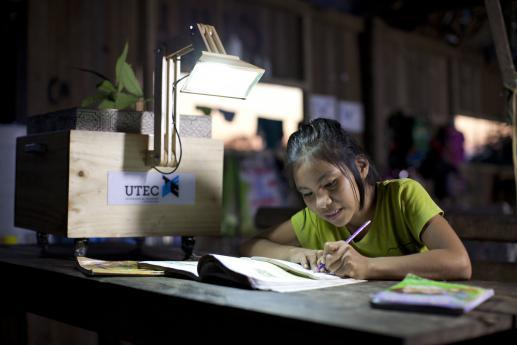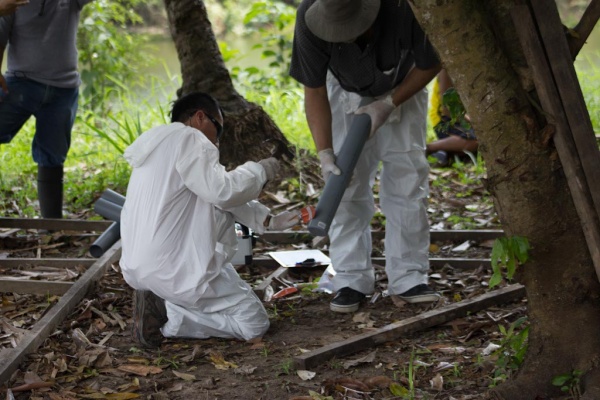| Blogs > looklook > Views from the Balcony |
|
Not a Magic Trick---- Pure Science Could the rhythm of daily life be governed by nature? Those who are interested to learn more about it may please ponder on the question before going through the appended story. What could happen to us if our accesses to electricity, piped water or other daily needs are lost suddenly due to unforeseen catastrophe? If interested, you may read the story of a small and modest indigenous community in the heart of the Peruvian jungle, where the rhythm of daily life is governed by nature. The story is pasted below without making any change to the original for those who are really interested to know what happened to the people of a remote village located in a Peruvian Jungle after they lost access to the little electricity they had: “The village is only accessible by a 5-hour boat ride along the Ucayali River from the town of Pucallpa (in the Ucayali region, in the extreme east of Peru). There are 173 people of the Shipibo-Conibo ethnic group living in Nuevo Saposoa, one of the largest yet most forgotten indigenous groups of Peru. In March 2015, a severe flood changed their course of life. The rustic local power plants were damaged, the cables were destroyed and Nuevo Saposoa lost access to the little electricity it had. In the middle of the Amazon, a village was left in darkness. The Peruvian government struggled to intervene in the short term. It was then that a team of professors and students from the Universidad de Ingeniería y Tecnología (UTEC) came up with the idea of creating Plantalámparas (“plant lamps”). Why not solve the problem caused by nature with a solution from nature, they asked. Elmer Ramírez, a professor at UTEC, explains that Plantalámparas are efficient, energy-saving lamps (300 lumens) that generate light using photosynthesis from plants. “Plants take CO2 (carbon dioxide) from the environment and water and minerals from the ground. Using these components, plants produce nutrients to grow, but they make these nutrients in excess. The plant expels the excess nutrients into the ground, where they interact with various micro-organisms in a complex electrochemical process, generating electrons,” explains Ramírez. He continues, “We capture these electrons using electrodes and store them in a battery. Once charged, this battery can power an efficient, energy-saving lamp. A Plantalámpara can stay on for two hours, and then can always be recharged using the same process we described before. It is an environmentally friendly product.” When the professors and students from UTEC travelled to Nuevo Saposoa and explained the process by which a plant could generate electric light, the inhabitants were skeptical. And when they performed their tests and the first light bulb was turned on, there were a few nervous laughs, as if it were a magic trick rather than science. “It’s a type of renewable energy that has a lot to give, since there are plants all over the world,” explains Marcello Gianino, a young university student. The impact of the plant lamps on the daily life of the Nuevo Saposoa inhabitants is already beginning to be felt. For now, many hope to finish school so they can study something related to energy and the environment at university. Every inhabitant of this indigenous community can now have at least two hours of light, and can power the Plantalámparas so that others can benefit. The schoolchildren are the ones who get the most out of this initiative." Hello dear readers,do you like such initiatives? Story ::Ricardo León, El Comercio Photos:Santiago Barco        |
|||
|
Interesting. If each one is lit for two hours, I wonder how long it takes to recharge? It seems like such a small plant in each box, I also wonder if two or three plants would recharge faster? Just think how wonderful this is for the children who need to study when there is not sunlight! I'm afraid we, who have so much, do not appreciate all we have. Be a prism, spreading God's light and love, not a mirror reflecting the world's hatred.
| ||
|
LookLook, this is a pretty amazing idea and can solve a lot of problems if it can be done economically. The problem with new technologies like this are the start-up costs. If they can be held to a minimum there can be endless potential uses, even in urban areas. Think about these: Street lights, traffic signals, wi-fi availability, cell phone towers, airport runway lights, and even emergency power for hospitals, schools and businesses. Thanks for a very interesting article. Fossil
| ||
|
Interesting. If each one is lit for two hours, I wonder how long it takes to recharge? It seems like such a small plant in each box, I also wonder if two or three plants would recharge faster? Just think how wonderful this is for the children who need to study when there is not sunlight! I'm afraid we, who have so much, do not appreciate all we have. Take care and be happy.
| ||
|
Mary Ann, thank you so much for welcoming me back. As I was not feeling well, I took a break from blogging. I agree with you that the idea is innovative and has potentiality too. We know necessity is the mother of invention! We have introduced solar panels producing electricity in far off and remote areas of my homeland where regular power supply is not available. Introduction of the system has changed the rhythm of life of the inhabitants of these areas totally. Have a nice time. Take care,
| ||
|
Nice to see you back to read my latest blog, MySeek2day, after a considerable time. Thank you so much for your responses too. I think your idea though great may not work as the technology is yet to be invented! We can however wait for the day when we could be able to put your idea into practice. Have a nice time and take care of yourself.
| ||
|
A small solar panel, battery and LED light set up would last all night. Photosynthesis needs light aslo, I dont know if the plants would generate much at night. You need 4 plant lights for 8 hours of light. Good idea in low light or cloudy areas though as plants would possibly still produce more than solar but I dont know the comparable figures. Good idea if cost isnt prohibitive. Any alternative environmentally friendly power has to be good though. Did you know you can stick lengths of copper into the ground over wired together and get a current even though it's not very high voltage. Judgment Day will be interesting - and all paths lead there.
| ||
|
You can also put copper and zinc nails into a lemon wired in a certain way and generate some power for a short time as the acid carries the electrolytic current. A guy on 'U toob' starts a fire with the current & steel wool from a wired lemon. Judgment Day will be interesting - and all paths lead there.
| ||
|
Wonderful initiative - how marvellous nature and science in tandem.
| ||
|
A small solar panel, battery and LED light set up would last all night. Photosynthesis needs light aslo, I dont know if the plants would generate much at night. You need 4 plant lights for 8 hours of light. Good idea in low light or cloudy areas though as plants would possibly still produce more than solar but I dont know the comparable figures. Good idea if cost isnt prohibitive. Any alternative environmentally friendly power has to be good though. Did you know you can stick lengths of copper into the ground over wired together and get a current even though it's not very high voltage.
| ||
|
You can also put copper and zinc nails into a lemon wired in a certain way and generate some power for a short time as the acid carries the electrolytic current. A guy on 'U toob' starts a fire with the current & steel wool from a wired lemon.
| ||
|
Welcome back, Looklook. Thanks for this interesting article. I've learned something new today.
| ||
|
Wonderful initiative - how marvellous nature and science in tandem. Thanks for stopping by and your response. I appreciate. Stay well and cheerful.
| ||
|
Welcome back, Looklook. Thanks for this interesting article. I've learned something new today.
|
×
×






